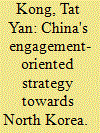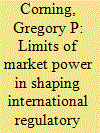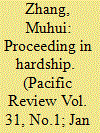|
|
|
Sort Order |
|
|
|
Items / Page
|
|
|
|
|
|
|
| Srl | Item |
| 1 |
ID:
160010


|
|
|
|
|
| Summary/Abstract |
In response to the challenge of unstable North Korea (weak economy, weapons of mass destruction [WMD] development), China has followed an engagement-oriented strategy based on diplomatic persuasion, economic interaction and moderate economic sanctions. Intensified engagement (2009–2012) facilitated North Korean convergence with China in respect of economic reform but divergence has persisted over WMD development. Despite the widening of divergence since 2013, China has refrained from applying crippling sanctions. This article seeks to explain these diverging results and their implications for China's strategy towards North Korea. Reviewing recent literature and data, it will argue that Chinese economic input reinforced the trend of economic reform that formed the basis of political consolidation under the new hereditary regime. On the other hand, the prospect of stable dependence on China ran counter to that regime's pursuit of WMDs as the basis of security and diplomatic diversification. These mixed results reveal the limits of China's strategy: its economic input involuntarily reinforces North Korea's WMD potential but it is not prepared to accept the risks of enforcing WMD restraint by crippling sanctions either. With limited room for manoeuvre, the attainment of China's strategic objectives ultimately depends upon policy change from the US or South Korea.
|
|
|
|
|
|
|
|
|
|
|
|
|
|
|
|
| 2 |
ID:
160008


|
|
|
|
|
| Summary/Abstract |
In this paper, we assess the drivers of, and prospects for, further security cooperation in the Australia–Japan bilateral relationship. We argue that while balance of threat and capability gaps may restrain the pace of deepening Australian-Japan security relations, these gaps are diminishing and are, in any case, secondary to the specific shared interests we posit as the primary drivers of Australia–Japan security cooperation. These specific interests, however, are shaped not only by a commitment in both countries to liberal-based principles and freedoms at home and in inter-state relations, but also by a common awareness of the importance of continued US primacy to the ongoing maintenance of those interests. Thus, in the absence of any fundamental change in how Australia and Japan understand their respective interests and the US role in the region, Donald Trump's recent and unexpected election as US president notwithstanding, we conclude that the case for further security cooperation – via additional cross-bracing of their respective US alliance relationships – will almost certainly remain compelling for both countries.
|
|
|
|
|
|
|
|
|
|
|
|
|
|
|
|
| 3 |
ID:
160006


|
|
|
|
|
| Summary/Abstract |
What factors shape the ability of the United States to negotiate international regulatory cooperation? This paper discusses three theoretical approaches that help to explain the potential for regulatory change – market power, historical institutionalism, and loss avoidance – and applies them to the negotiation of regulatory issues in the Trans-Pacific Partnership (TPP). It seeks to understand why the regulatory disciplines in some TPP chapters were more rigorous than those in other chapters. Focusing on case-studies of the chapters on state-owned enterprises and regulatory coherence, the paper argues that the market power of the United States is more likely to secure stronger regulatory disciplines when there is: (1) a strong loss avoidance coalition in the USA pushing for change, and (2) a weakly institutionalized regulatory framework among parties in a given issue area that makes path dependence less important.
|
|
|
|
|
|
|
|
|
|
|
|
|
|
|
|
| 4 |
ID:
160011


|
|
|
|
|
| Summary/Abstract |
Why has there been no jihadist civil war in Southeast Asia? Although there has been a global surge in armed conflicts where at least one side fights for self-proclaimed Islamist aspirations, the region of Southeast Asia stands out by not having experienced a single jihadist civil war after 1975. Yet, so far, there have been no systematic comparisons of the frequency and nature of the Islamist violence in Southeast Asia and the rest of the world. This study therefore contributes by exploring the empirical trajectories in the region and situating Southeast Asia to global developments, utilizing new and unique data on religiously defined armed conflicts 1975–2015. We find that whereas the number of people killed in Islamist violence has increased in the rest of the world, it has decreased in Southeast Asia. We argue that Southeast Asia has prevented outbreaks of jihadist civil wars, and contained and partially resolved ongoing Islamist conflicts before they have escalated, due to three interrelated factors: the lack of internationalization of Islamist conflicts in the region, the openness of political channels for voicing Islamist aspirations, and government repression. This article suggests insights from the region that can be valuable from a global perspective.
|
|
|
|
|
|
|
|
|
|
|
|
|
|
|
|
| 5 |
ID:
160007


|
|
|
|
|
| Summary/Abstract |
This article explores the early potential of the Framework for Pacific regionalism, a new political process that Pacific nations are using to establish regional development priorities. The emergence of this process is positioned within a context of a desire for a new era of Pacific-led regional development collaboration. The early outcomes of the Framework are outlined and examined. Specifically, the article questions whether it is meeting aspirations for ‘game-changing’ development goals that enjoy greater levels of ‘ownership’ amongst Pacific leaders. It also explores whether the new process canbe seen as evidence of a new era of ‘post-hegemonic’ regionalism in Oceania, characterised by a revitalisation of regional political debate; a rejection of ‘economism’; and the reassertion of indigenous and civil society concerns.
|
|
|
|
|
|
|
|
|
|
|
|
|
|
|
|
| 6 |
ID:
160009


|
|
|
|
|
| Summary/Abstract |
In recent decades, the development of trilateral institutions among China, Japan and South Korea has begun to take shape. This study analyzes its strengths and weaknesses with regard to the nexus between trilateralism and bilateralism. A well-functioning trilateral grouping needs to overcome two structural limitations – dilution effects and bilateral constraints – both of which are triggered by embedded bilateral approaches. The critical juncture approach is effective in terms of elevating the payoffs of cooperative trilateralism during times of exigency. However, once common crises have dissipated, trilateralism has revealed starkly different performances with respect to functional and political-diplomatic cooperation. This article adopts a dichotomous approach between the two. Functional trilateralism has been steadily growing, and has proven to be less subject to fluctuations in the nations’ political relationships. Its outcomes are positive and worthy of praise. However, the outcomes of trilateralism have been less convincing in fields of middle and high politics. Trilateralism is overwhelmingly subject to fluctuations when its embedded bilateral relations change, and cooperative outcomes within a trilateral grouping are prone to being diluted by bilateral approaches. China–Japan–Korea trilateralism at diplomatic levels remains more an extension of bilateral relations than a mature form of minilateral arrangement.
|
|
|
|
|
|
|
|
|
|
|
|
|
|
|
|
| 7 |
ID:
160012


|
|
|
|
|
| Summary/Abstract |
The relationship between Thailand and China has been both long and complicated, with periods of conflict associated with, for example, the cold war. In recent years, and especially following the Asian Economic Crisis, there has been a blossoming of the relationship, built on careful diplomacy, a renewal of interest in ethnicity and expanding business dealings and rising bilateral investment. In the contemporary period, the relationship has reached a new high. Since Thailand's military junta came to power in 2014, China has been a significant diplomatic, economic and strategic partner. Part of the explanation for this has to do with the junta's inability to deal with the USA following the coup. This article suggests that the turn to China has much to do with Thailand's turbulent domestic politics. In examining this bilateral relationship, this article addresses issues related to infrastructure, business and trade, military co-operation and cultural relations.
|
|
|
|
|
|
|
|
|
|
|
|
|
|
|
|
|
|
|
|
|